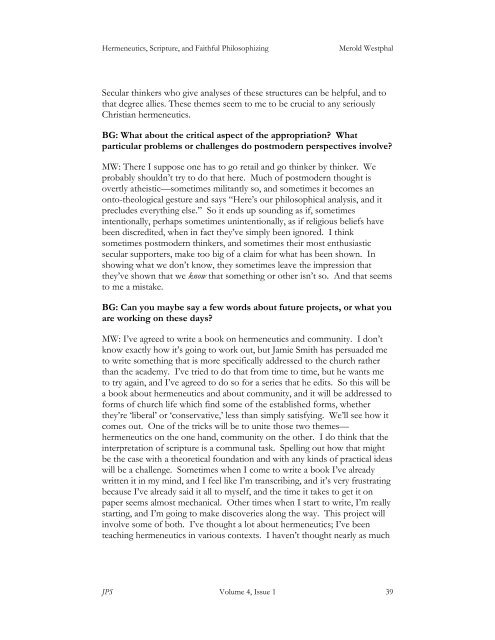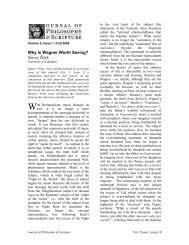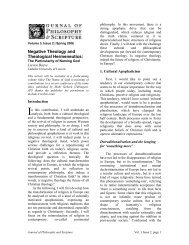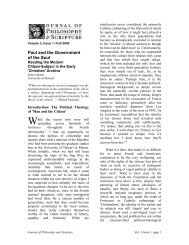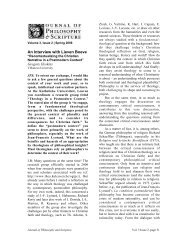interview with Merold Westphal - Journal of Philosophy and Scripture
interview with Merold Westphal - Journal of Philosophy and Scripture
interview with Merold Westphal - Journal of Philosophy and Scripture
Create successful ePaper yourself
Turn your PDF publications into a flip-book with our unique Google optimized e-Paper software.
Hermeneutics, <strong>Scripture</strong>, <strong>and</strong> Faithful Philosophizing <strong>Merold</strong> <strong>Westphal</strong><br />
Secular thinkers who give analyses <strong>of</strong> these structures can be helpful, <strong>and</strong> to<br />
that degree allies. These themes seem to me to be crucial to any seriously<br />
Christian hermeneutics.<br />
BG: What about the critical aspect <strong>of</strong> the appropriation? What<br />
particular problems or challenges do postmodern perspectives involve?<br />
MW: There I suppose one has to go retail <strong>and</strong> go thinker by thinker. We<br />
probably shouldn’t try to do that here. Much <strong>of</strong> postmodern thought is<br />
overtly atheistic—sometimes militantly so, <strong>and</strong> sometimes it becomes an<br />
onto-theological gesture <strong>and</strong> says “Here’s our philosophical analysis, <strong>and</strong> it<br />
precludes everything else.” So it ends up sounding as if, sometimes<br />
intentionally, perhaps sometimes unintentionally, as if religious beliefs have<br />
been discredited, when in fact they’ve simply been ignored. I think<br />
sometimes postmodern thinkers, <strong>and</strong> sometimes their most enthusiastic<br />
secular supporters, make too big <strong>of</strong> a claim for what has been shown. In<br />
showing what we don’t know, they sometimes leave the impression that<br />
they’ve shown that we know that something or other isn’t so. And that seems<br />
to me a mistake.<br />
BG: Can you maybe say a few words about future projects, or what you<br />
are working on these days?<br />
MW: I’ve agreed to write a book on hermeneutics <strong>and</strong> community. I don’t<br />
know exactly how it’s going to work out, but Jamie Smith has persuaded me<br />
to write something that is more specifically addressed to the church rather<br />
than the academy. I’ve tried to do that from time to time, but he wants me<br />
to try again, <strong>and</strong> I’ve agreed to do so for a series that he edits. So this will be<br />
a book about hermeneutics <strong>and</strong> about community, <strong>and</strong> it will be addressed to<br />
forms <strong>of</strong> church life which find some <strong>of</strong> the established forms, whether<br />
they’re ‘liberal’ or ‘conservative,’ less than simply satisfying. We’ll see how it<br />
comes out. One <strong>of</strong> the tricks will be to unite those two themes—<br />
hermeneutics on the one h<strong>and</strong>, community on the other. I do think that the<br />
interpretation <strong>of</strong> scripture is a communal task. Spelling out how that might<br />
be the case <strong>with</strong> a theoretical foundation <strong>and</strong> <strong>with</strong> any kinds <strong>of</strong> practical ideas<br />
will be a challenge. Sometimes when I come to write a book I’ve already<br />
written it in my mind, <strong>and</strong> I feel like I’m transcribing, <strong>and</strong> it’s very frustrating<br />
because I’ve already said it all to myself, <strong>and</strong> the time it takes to get it on<br />
paper seems almost mechanical. Other times when I start to write, I’m really<br />
starting, <strong>and</strong> I’m going to make discoveries along the way. This project will<br />
involve some <strong>of</strong> both. I’ve thought a lot about hermeneutics; I’ve been<br />
teaching hermeneutics in various contexts. I haven’t thought nearly as much<br />
JPS Volume 4, Issue 1 39


